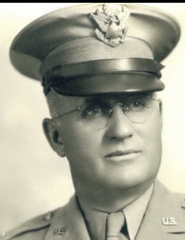Miles Finds Out About Deep Mud in North Italy
(By FRANK Miles)
(Iowa Daily Press War Correspondent)
With the Fifth Army in Italy -- (IDPA)-- Pfc. Robert Angell, Mason City, miraculously escaped death or serious injury when a jeep with trailer he was driving plunged off a mountain road down a 100-foot cliff in North Italy.
He held to the steering wheel and suffered only a few minor bruises. The jeep was wrecked.
A few seconds after the crash, Staff Sgt. Kermit Berg, Callender, had raced to Angell's side. Angell then was on his feet, smiling.
Heavy rains make the dirt on trails in the Appenines treacherous. Angell was travelling at moderate speed after delivering rations to 34th division comrades at the front. Rear wheels of the trailer left the road on a curve, causing it to topple over and pull the jeep with it.
Angell, the son of Mr. and Mrs. William Angell, Mason City, had been with the 34th in Ireland, England, Africa and Italy since February, 1942.
I happened to be returning from another division front about the time the wrecking crew arrived. It was amazing how quickly men and machines lifted the damaged jeep and trailer back on the road.
The Mud was Deep
Out in the field that say I saw engineers rebuilding a bridge the enemy had blown up in flight before the advancing yanks. Mud was shoe top deep but groups of six men were lugging 590-pound panels from a pile on the roadside to the structure. Their wisecracks indicated that while they might not have been hugely enjoying themselves they didn't mind the task much. The planking was down so the lieutenant in charge would allow traffic to pass at intervals.
A general's car had to wait its turn but all ambulances coming from and going to the battle line shot through without delay.
In a valley nearby two heavy guns were hurling shells at the nazis. The scream of a projectile and the sound of an explosion are more ominous in murky than in clear atmosphere.
Soldiers Eat in Rain
Farther up, soldiers were getting their mess kits filled with rations from an army kitchen which had been set up in an old shed. Drizzling rain caused many of them to shield their food with their helmets, letting their heads get wet.
My jeep driver and I finally reached the gate of a field from where I was informed I might visit a command post I was seeking . An MP said it was about 400 yards up the side of a hill which led to another mountain, adding I should have to walk the distance. I got there with what felt like a ton of mud on each of my boots and plenty on each hand from falls. A lieutenant colonel who didn't see me until I entered his tent wanted to know if I had dropped in via parachute.
After a talk with him I pushed on over a crest and down to a road where I encountered infantrymen. They were bound for timber from where they were to make their way to positions around another mountain. Nazi machine pistols, which fire incredibly fast, were popping away.
Welcome by Captain
A young, obviously combat-bitten captain spoke to me cordially, then kindly suggested that was no place for a war correspondent, armed only with a note book and pencil. It probably wouldn't have helped any if I had told him I had a small knife and a nail clip in a pants pocket.
Hoofing back to my jeep, I recalled that a reader of my articles for the Iowa Daily Press Assn., wrote asking if we, who try to write what we see of war, carry weapons. We are not allowed to for various reasons. Officers and men treat us well though some no doubt look upon us as nuisances. I have yet, however, to ask a question who didn't come through with a straightforward answer to the best of his knowledge, if he was permitted to divulge the information sought.
Source: Muscatine Journal News-Tribune, Nov. 2, 1944
![]()

